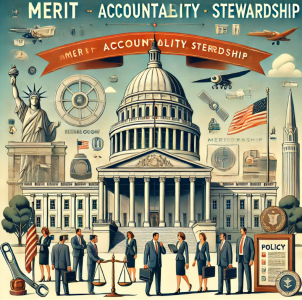Widgetized Section
Go to Admin » Appearance » Widgets » and move Gabfire Widget: Social into that MastheadOverlay zone
From Virtue Signaling to Virtue Governance: Reclaiming Accountability and Merit in Public Administration
The views expressed are those of the author and do not necessarily reflect the views of ASPA as an organization.
By Charles Mason
April 4, 2025

Public administration is entering a critical period of reckoning. As the challenges of artificial intelligence, automation, electoral distrust and fiscal mismanagement mount, many of the responses within the public sector have leaned heavily on virtue signaling, such as public statements or symbolic actions that prioritize appearance over substance, emotional appeals or ideologically driven initiatives. Yet effective governance requires more substantial measurable accountability, fiscal stewardship and a clear return to merit-based leadership.
Recent articles in PA TIMES Online reflect some of the most pressing discussions in public policy today—from the impacts of AI and robotics to defending diversity, equity and inclusion (DEI) programs.
Technology and the Public Good
In “Governments Should Prepare Now for the Unprecedented Impacts of AI + Robotics,” Wilson Wong rightly warns of automation’s disruption to labor markets. The concern is valid, but we must be careful. Preparation cannot mean the proliferation of untested programs or massive spending increases without accountability. Public administrators must pair innovation with fiscal constraint. This means investing in targeted workforce development—not blanket programs—and creating opportunities for those demonstrating capacity and competence. Instead, we should channel funds into measurable retraining outcomes, support performance-based hiring practices and promote accountability for results.
Similarly, Bill Brantley’s “Vibe Coding in Government” proposes democratizing coding through AI-assisted tools. While promising, this idea must be approached with caution. Technology should empower competent workers, not bypass the need for training or security. If every civil servant becomes a “developer” without oversight, we risk inefficiency and security breaches. The focus must be on deploying technology to amplify skilled professionals, not as a shortcut for bypassing expertise.
The DEI Dilemma: Intentions vs. Outcomes
In “In Defense of DEI,” Tanya Settles argues for the continued relevance of diversity and inclusion. Indeed, no ethical administrator should oppose fair hiring or inclusive work environments. However, the rise of DEI programs is without clear performance metrics, such as specific goals for diversity and inclusion and regular evaluations of their effectiveness.
What measurable outcomes have DEI programs delivered? Are they increasing productivity, strengthening interagency collaboration, or helping the taxpayer? Or are they creating new bureaucracies that divert resources from critical services?
Public service should be a competition of competence. When government roles are filled based on demographic targets rather than qualifications, it damages morale and weakens public trust. A genuinely inclusive workforce is one where all applicants—regardless of background—compete with rewards based on contribution, not categories.
Electoral Reform and Institutional Trust
Stephen Rolandi’s article on electoral reform reminds us that restoring faith in government institutions must be a top priority. His suggestion of proportional allocation of electoral votes via the Lodge-Gossett amendment, a proposed amendment that aims to distribute electoral votes based on the proportion of popular votes each candidate receives, is historically interesting—but it won’t fix what’s broken.
Citizens don’t mistrust elections because of the Electoral College—they mistrust them because they believe institutions lack transparency and fairness. Real reform must prioritize secure voting systems, unbiased audits and clear accountability—not just theoretical redistribution.
Avoiding Shutdowns by Trimming the Fat
Michelle M. Buehlmann’s article, “Avoiding a Shutdown Is Best,” echoes a common refrain. However, avoiding shutdowns doesn’t mean maintaining the status quo. Budget crises are often the result of unchecked spending and bloated agencies.
Instead of asking how to keep everything funded, administrators should ask: What isn’t working? Public administration must evaluate programs rigorously, trim inefficiencies and defend only what delivers measurable value. We cannot govern by emotion; we must govern by data.
The Path Forward: Principles That Serve the People
Public administration must return to its roots: service, stewardship and standards. This means recommitting to three foundational principles:
- Meritocracy: Reward excellence, not identity. Government roles should be earned through skill, not assigned for demographic balance. By upholding the principle of meritocracy, we can ensure that every individual is valued and respected for their unique talents and contributions.
- Accountability: Every program must justify its existence. Agencies must prove they are serving the public effectively. If a DEI office, retraining program or AI initiative can’t show results, it must be reformed or removed. This commitment to accountability will reassure the public and stakeholders that their resources are being used effectively and responsibly.
- Fiscal Discipline: The federal government spends trillions, yet deficits mount. Public administrators must lead in cutting waste, modernizing operations and streamlining services. Stewardship of taxpayer dollars is not optional—it is a moral responsibility. By exercising fiscal discipline, we can spend every dollar wisely, enhancing public trust and confidence in our governance.
Real Virtue in Governance
Virtue signaling will not save American institutions. Real virtue lies in doing what is difficult but necessary: making hard choices, holding ourselves accountable and insisting that every public role—from coder to commissioner—is filled by someone who earned it.
Public administration should not follow trends. Instead, it should adhere to timeless principles: fairness, service and results. Doing so will restore our institutions’ credibility and our nation’s prosperity.
Author: Charles Mason, Ph.D., is a graduate of Walden University in Public Policy and Administration specializing in Criminal Justice. He is also a graduate of Barry University with an MPA and a graduate of Vincennes University with a Bachelor of Science in Homeland Security and Public Safety. He has over 30 years of experience in security, local law enforcement, state corrections and military service. He is currently president of Mason Academy. He can be reached at [email protected]. Twitter: https://twitter.com/DRCharlesMason


Follow Us!